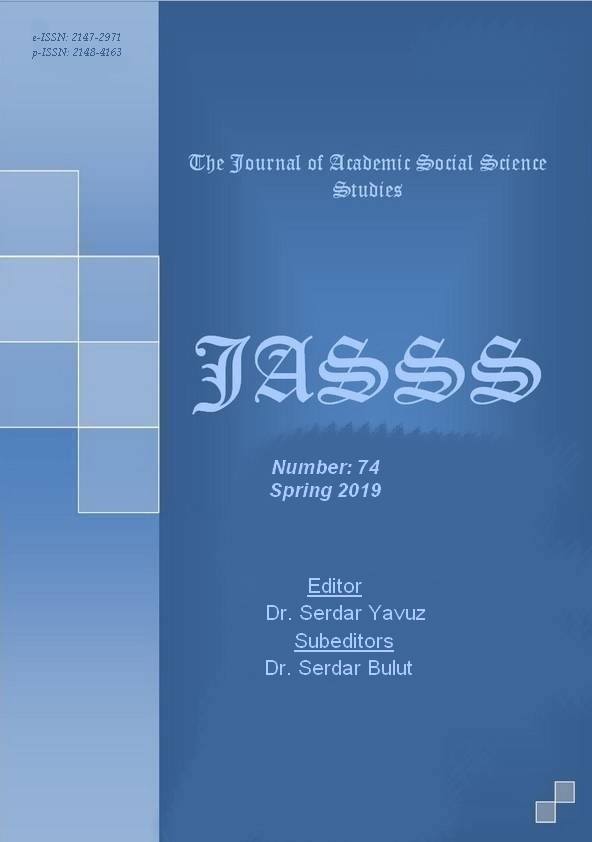Author :
Abstract
Bu araştırmanın amacı, ilkokul dördüncü sınıf öğrencileri ile gerçekleştirilen beceri temelli eleştirel düşünme öğretiminin, öğrencilerin eleştirel düşünme becerilerine etkisini belirlemek ve öğrencilerin eleştirel düşünme ile ilgili görüşleri hakkında bilgi toplamaktır. Bu genel amaç doğrultusunda ilkokul dördüncü sınıfta beceri temelli eleştirel düşünme öğretimi uygulanılan deney grubu ile kontrol grubunun eleştirel düşünme ölçeği analiz, değerlendirme, çıkarım, yorumlama, açıklama, öz düzenleme alt boyutlarında ön test puanları ile son test puanları arasında anlamlı istatistiksel bir fark var mıdır? İlkokul dördüncü sınıf deney grubundaki öğrencilerin eleştirel düşünme becerisi öğretimi uygulamasına ilişkin görüşleri nelerdir? Şeklinde alt amaçları belirlenmiştir. Araştırma Milli Eğitim Bakanlığı’na bağlı bir devlet okulunda 2017-2018 eğitim öğretim yılı ilkokul dördüncü sınıf öğrencileriyle gerçekleştirilmiştir. Öğrencilerin hazırbulunuşluk düzeyleri göz önüne alınarak, araştırmada amaçsal örnekleme yöntemi ile çalışma grubu belirlenmiştir. Araştırmada deney grubu ve kontrol grubu olmak üzere iki grup öğrenci vardır. Deney grubunda 25, kontrol grubunda ise 23 öğrenci olmak üzere toplam 48 öğrenci yer almaktadır. Bu araştırma nicel ve nitel metodun birlikte kullanıldığı karma bir çalışma olacak şeklide tasarlanmıştır. Araştırmanın nicel boyutunun yarı deneysel şekilde olup, ön test-son test kontrol gruplu araştırma modeli, araştırmanın nitel boyutunda ise yarı yapılandırılmış görüşme formu kullanılmıştır. Verilerin toplanmasında, öğrencilerin eleştirel düşünme düzeylerini ölçmek amacıyla Demir (2006) tarafından geliştirilen ve eleştirel düşünmenin alt düşünme boyutlarını ölçmeyi amaçlayan ölçek kullanılmıştır. Aynı zamanda Beceri temelli eleştirel düşünme öğretiminin uygulamasına dair öğrenci görüşlerinin alınmasına ilişkin araştırmacı tarafından hazırlanmış olan Yarı Yapılandırılmış Görüşme Formu ve deney ve kontrol gruplarındaki öğrenciler arasında cinsiyet, anne-baba meslek durumu gibi sosyo-demografik özellikler açısından anlamlı farklılık olup olmadığını belirlemek için “ Kişisel Bilgiler Formu”ndan yararlanılmıştır. Araştırmanın nicel boyutunu oluşturan Eleştirel Düşünme Ölçeği’nden elde edilen ön test-son test puanları ile ve Kişisel Bilgiler Formu’na vermiş oldukları cevaplar oluşturmaktadır. Araştırmanın sonuncunda uygulanan Cort 1 düşünme programının öğrencilerin eleştirel düşünme becerileri alt boyutları olan analiz, çıkarım, açıklama ve öz düzenleme becerileri üzerinde istatistiksel olarak anlamlı bir fark gösterirken, değerlendirme ve yorumlama alt boyutlarında istatistiksel olarak anlamlı bir fark görülmemiştir. Aynı zamanda kontrol grubu öğrencilerinin Eleştirel Düşünme Ölçeği son test puanları ile deney grubu son test puanları arasında da istatistiksel olarak anlamlı bir fark olduğu söylenebilir.
Keywords
Abstract
The aim of this research is to determine the effect of skill-based critical thinking education, carried out with fourth-grade students, on critical thinking skills of the students and to gather information about students' views on critical thinking. In line with the aim, answers to the following questions were sought: 1. Is there a statistically significant difference between the experimental group and the control group students in critical thinking analysis sub-dimension? 2. Is there a statistically significant difference between the study group and the control group students in critical thinking evaluation sub-dimension? 3. Is there a statistically significant difference between the study group and the control group students in critical thinking inference sub-dimension? 4. Is there a statistically significant difference between the study group and the control group students in critical thinking interpretation sub-dimension? 5. Is there a statistically significant difference between the study group and the control group students in critical thinking interpretation sub-dimension? 6. Is there a statistically significant difference between the study group and the control group students in critical thinking self-regulation sub-dimension? 7. What are the opinions of study group students about critical thinking teaching? The study was realized with fourth-grade students in a state school affiliated to the Ministry of National Education in the first semester of the 2017-2018 academic year. The study group was determined with purposive sampling method and there are 48 students in total, 25 students in the study group and 23 students in the control group. In this study, the convergent parallel pattern of the mixed method was used to gather information to determine the effect of skill-based critical thinking education, carried out with fourth-grade students, on critical thinking skills of the students and to gather information about students' views on critical thinking. In the collection of data, the data collection tools were collected in two groups as quantitative and qualitative data collection tools. In quantitative data collection tools, Critical Thinking Scale developed by Demir (2006) was used to measure students' critical thinking levels. There are 6 chapters in the scale aiming to measure the sub-dimensions of critical thinking. In the experimental group, the Cort 1 thinking program was used. A statistically significant difference was found in favor of the study group for Cort 1 thinking the program, in which quantitative findings of the study applied, on analysis, evaluation, inference, interpretation, explanation and self-regulation skills of the students. Based on the research results it can be said that, skill-based critical thinking skill programs can be incorporated in students' lives to help them gain the ability to think critically, and when critical thinking skills education program is applied it positively affects students' attitudes towards class and increases their expectations towards the continuation of the course. It is recommended to carry out this study with a longer application time, by making the examples in practice more suitable for students' readiness levels, and to implement them by making arrangements based on the students' daily lives, and also to conduct activities with students for group work, for the training of skill-based critical thinking that is all based on group work, before starting the implementations.





